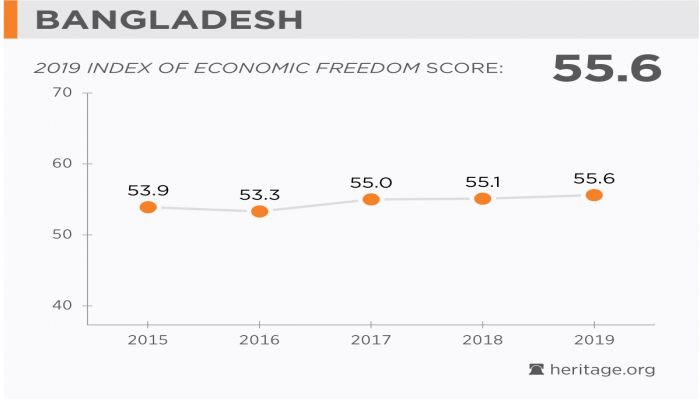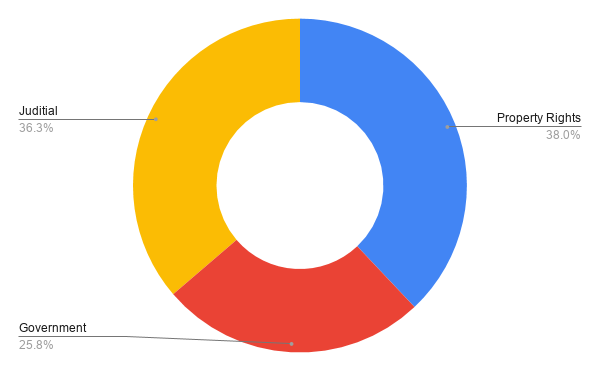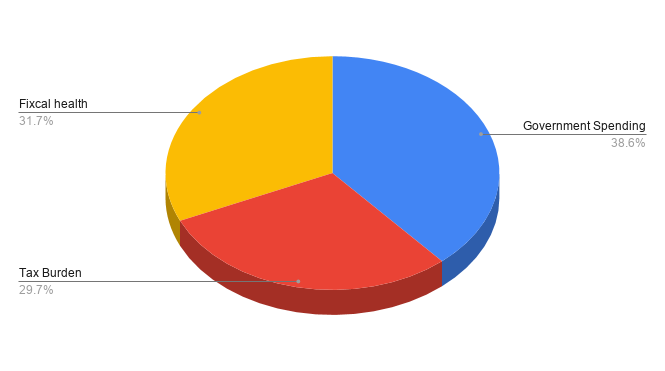
Desk report
Publish: 07 Dec 2019, 10:48 pm
Bangladesh ranked 27th among 43 countries in the Asia–Pacific region

The Economic Freedom score of Bangladesh is 55.6, making its economy in the 121st position in the 2019 Index. Its overall score has improved by 0.5 points, with higher scores on factors including property rights and government integrity countering falls in investment freedom and fiscal health.
Bangladesh is ranked 27th among 43 countries in the Asia–Pacific region, and its overall score is below the regional and world averages.
Robust economic growth approximately 6 percent annually for two decades has been driven by a rapid increase in private consumption and fixed investment. Having said that, Bangladesh still gets stuck into poor infrastructure, endemic corruption, insufficient power supplies, and slow implementation of economic reforms. The shaky rule of law continues to undermine economic development. Corruption and weak enforcement of property rights force workers and small businesses into the informal economy. Entrepreneurial activity is also impeded by an uncertain regulatory environment.
Bangladesh is a large Muslim-majority democratic country sharing borders with India and Burma. The British partition of India in 1947 resulted in the creation of West Pakistan and, in the Muslim-majority areas of Bengal east of India, East Pakistan. After a brutal conflict for independence from West Pakistan, East Pakistan, aided by India, declared itself the independent state of Bangladesh in 1971. Two political parties have alternated in power for decades. Prime Minister Sheikh Hasina of the Awami League was reelected in 2014. The opposition Bangladesh Nationalist Party boycotted the 2014 election and threatened to boycott elections that were scheduled for late December 2018. Despite political instability, economic growth is robust, led by garment exports.
Rule of Law
Property laws are old-fashioned, and land disputes are common. The judiciary is slow and lacks independence. Contract enforcement and dispute settlement procedures are inefficient. Endemic corruption and criminality, weak rule of law, limited bureaucratic transparency, and political polarization have weakened government accountability. High-profile corruption cases are common. Two recent cases involved a chief justice and a former prime minister.

GOVERNMENT SIZE
The top income tax rate is 25 percent, and the top corporate tax rate is 45 percent. Other taxes include a value-added tax. The overall tax burden equals 8.8 percent of total domestic income. Over the past three years, government spending has amounted to 13.6 percent of the country’s output (GDP), and budget deficits have averaged 3.6 percent of GDP. Public debt is equivalent to 32.4 percent of GDP.

REGULATORY EFFICIENCY
Despite some growth in streamlining business regulations, entrepreneurial activity is curbed by an uncertain regulatory environment and the absence of effective long-term institutional support for private-sector development. A well-functioning labor market has not been fully developed, but labor productivity growth has been slightly higher than wage hikes. The state continues its extensive subsidizing of food, fuel, electricity, and agriculture.
-5debd3dff0ec2.png) OPEN MARKETS
OPEN MARKETS
The combined value of exports and imports is equal to 35.3 percent of GDP. The average applied tariff rate is 10.7 percent. The government has taken steps to diminish bureaucratic barriers to investment, but overall progress has been slow. State ownership and interference in the financial sector remain considerable. About 54 percent of adult Bangladeshis have access to an account with a formal banking institution.
-5debd4b179068.png)
Source: The Heritage Foundation | heritage.org/Index
Subscribe Shampratik Deshkal Youtube Channel
© 2024 Shampratik Deshkal All Rights Reserved. Design & Developed By Root Soft Bangladesh